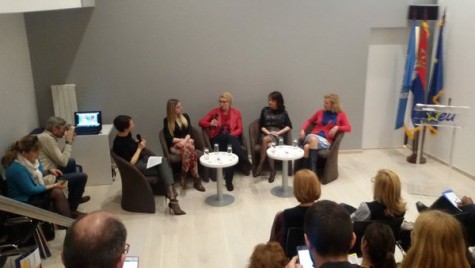International Women’s Day was marked at the EU Info Centre in Belgrade. Theme of the event was titled “What Is (Not) A Woman’s Job: My Job – My Right.” The panel discussion dedicated to promotion of women’s rights was organised by UN Team in Serbia and Centre of Modern Skills in cooperation with EU Info Centre.
Numerous visitors were addressed by Serbian Government Vice President/President of Coordinating Body for Equality Zorana Mihajlovic, Representative of UN Team in Serbia Michel Saint-Lot, Biljana Stepanov of Team Europe and women who have built their careers, or are still trying to prove themselves, in traditionally “men’s jobs” – piloting, fire fighting, mountain rescue service or as leaders of brass bands.
Serbia ranks 22 on the EU Gender Equality Index
Serbian Government Vice President/President of Coordinating Body for Equality Zorana Mihajlovic said the adoption of the new law on gender equality would mean another step towards the promotion of women’s rights, but would also protect the existing ones.
“Then we will have no dilemma whether I am doing a woman’s or a man’s job, and job interviews will no longer include questions such as: ‘Are you planning on getting pregnant?’” Mihajlovic said.
“A hundred years ago, women fought for the right to vote and take maternity leave, whereas today, we are fighting for visibility, recognition, to get paid equally as men when doing the same job, said Mihajlovic and added that this was not a one-day fight. She said women are present in politics thanks to the 30 per cent quota, even though there are electoral lists with more than 40 per cent of female candidates, but they are still under-represented in public companies, supervisory and management boards.
Photo: EUIC
Representative of UN Team in Serbia Michel Saint-Lot said women in Serbia were under a lot of pressure and under-represented in politics and labour. He reminded that last year, the UN adopted 2030 Sustainable Development Goals, among which gender equality is considered a high priority.
Saint-Lot welcomed good cooperation with Serbian Government, saying that there are many challenges and work ahead when it comes to gender equality, especially in terms of violence against women, labour rights gender gap gender stereotypes and the prevalent patriarchy attitudes.
“I am speaking for myself when I say this,” said Saint-Lot “but we should all ask ourselves: Is Serbia ready for a female President?”
Biljana Stepanov of Team Europe Serbia said the country has done plenty to improve the status of women, adding that Gender Equality Index ranked Serbia 22nd in Europe, with a score of 40.6 per cent, whereas the EU average was 52 per cent.
Serbia has impoverished a lot in the past years, and the purchasing power of citizens declined by 23 per cent. Hence, women, being the most vulnerable group, have become even more vulnerable, Stepanov said.
Women in “men’s” professions
The discussion was also participated in by women who are engaged in what is traditionally considered to be “man’s” profession, Snezana Madzarevic, working as a fire fighter, Olivera Knezevic, a pilot, Aleksandra Stankov-Mijatovic from the mountain rescue service and Danijela Veselinovic, a brass band leader.
They discussed the possibilities of successfully overcoming imposed gender roles and patterns. Should the profession name be gender specific to enable the change of social consciousness?; How did they manage to overcome the traditional gender roles; these were some of the questions asked and to answer them, panellists provided personal input.
Aleksandra Stankov-Mijatovic said 25 girls underwent the training and would become equal with men on the ground within mountain rescue service. Snezana Madzarevic, employed at the only female fire fighting service, said she did not mind about making the profession name gender specific because she always introduces herself by her name, adding that, apart from being a fire fighter, she is also an Acting Director in one school and President of Local Community in Vitkovac. Olivera Knezevic is a pilot and takes part in contests because she loves to fly, wheras Danijela Veselinovic is known as the only woman to perform at Guca Festival for the last thirteen years.
One of the messages of the session is “be aware of what you want to and can do and fight for it, do not wait for others to recognise your ambitions and abilities.”








